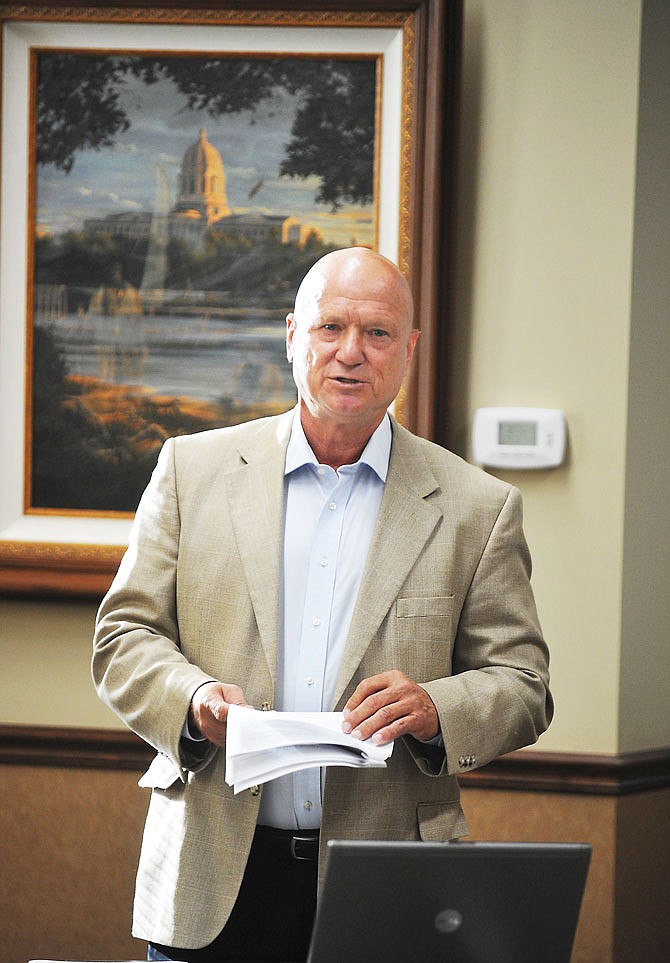It will be one of the last things state Rep. Mike Bernskoetter, R-Jefferson City, does as a member of the Missouri House of Representatives.
Bernskoetter, who is term-limited, reported Thursday to members of the Jefferson City Area Chamber of Commerce on the past legislative session. He is the only Republican candidate for the Senate District 6 race in November.
The last day of the full regular session was May 18, he said. But as soon as it concluded, legislators called themselves into a special session to consider impeachment proceedings for then-Gov. Eric Greitens. Less than two weeks later, Greitens resigned.
"We didn't need to take action," Bernskoetter said.
Then-Lt. Gov. Mike Parson was sworn in as governor June 1.
The special session remains standing, and members will call both chambers into a ceremonial joint session Monday so Parson can address the General Assembly.
Parson doesn't think any of Greitens' department heads need to be changed, Bernskoetter said.
"We had a very good legislative session this year despite all the distractions we had," he said. "We had a lot of distractions surrounding the allegations against the governor."
More than 1,500 bills were proposed in the House during the session and about 600 were proposed in the Senate. About 150 were truly agreed upon - meaning by both chambers - and passed at the conclusion of the session.
"One of the big things we passed was a tax cut for families and individuals," Bernskoetter said. "The tax rate right now is 5.9 (percent), and it's going to go down to 5.5."
Additional triggers in the legislation will reduce the rate to 5.1 percent if state revenues continue to improve, he said.
The Legislature also reduced the corporate tax rate from 6.25 percent to less than 4 percent.
The corporate tax rate was the cause of angst in the session's final days. Representatives learned from the Missouri Department of Revenue on May 16 that the budget package it passed the previous week would result in a shortfall of about $45 million. The DOR had scored the revenue based on the current corporate rate, not on the modified rate, which was intended to be 3.5 percent. It could have caused a deficit of $300 million for 2019. However, the chambers passed a modified budget that included the final corporate tax rate of 3.9 percent. The rate could lead to a deficit next year of $15 million or it could lead to a surplus of $2 million, representatives said.
The Legislature also approved a measure for the November ballot that would increase the fuels tax by 10 cents. It would increase the rate by 2.5 cents per gallon per year over the next four years.
"Right now, the Highway Patrol is being funded out of MoDOT's budget," Bernskoetter said. "This would actually be a public safety tax."
The money generated would go to the Highway Patrol, freeing up money the Missouri Department of Transportation could use on roads. It is expected to raise $288 million for the Highway Patrol and $123 million for construction and maintenance of local roads.
The General Assembly has been trying to modernize the electrical grid throughout the state for years, Bernskoetter said.
"There are rate caps in there," he said. "Rates have been going up for years."
Utility companies recently got federal tax cuts. They also got rebates, Bernskoetter said. That will be reflected in customers' bills, he said.
Farmers can grow hemp now, he added. That gives them another option for their crops.
The Legislature passed bills that would help prepare the state for new, faster wireless services.
It also passed tort and regulatory reforms. While it may seem odd at first glance, the well-known example, Bernskoetter said, is hair-braiding.
"Right now, even though all hair-braiders do is braid hair, they actually have to have a cosmetology license," Bernskoetter said.
That license requires nearly 1,500 hours of training.
Another bill people laughed about had to do with bingo operations. Years ago, when the state was first considering allowing gambling on riverboats, there were concerns organized crime would become involved in other sorts of gambling, such as bingo. As a result, legislators put in a requirement that any organization that held bingo events could not let people work those events unless they had been with the organization for at least two years. The Legislature removed that two-year requirement.
The Legislature also passed a law that "raises the age" for criminal prosecution as an adult from 17 to 18 for most crimes.
State workers got a pay increase that essentially will offset higher premiums for their health insurance, he said.
Through a bill Bernskoetter sponsored, the state is to convey 0.19 acres to the city to allow for a bridge that will connect to and make public access for Adrian's Island. City officials plan to develop the island into a park with an 826-foot bridge leading to it. The bridge would pass over the railroad tracks.
The project is estimated at $3.2 million, and an ad hoc committee has raised about $2.3 million, including a $1 million donation from local philanthropist B.J. DeLong, under the condition the money be used only for riverfront development.

